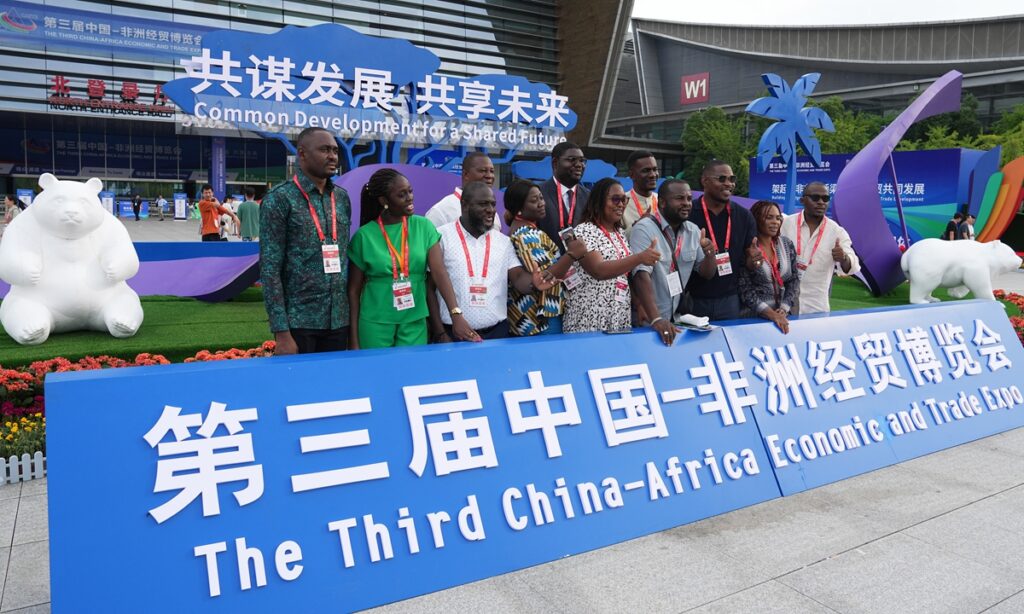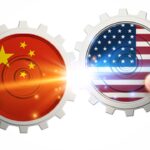The third China-Africa Economic and Trade Expo kicked off on Thursday in Changsha, Central China’s Hunan Province, where representatives from 53 African countries and 12 international organizations gathered to further boost bilateral cooperation, with deals worth $19.1 billion expected to be signed.
The expo offered another crucial platform for cooperation in various fields and further proof of thriving China-Africa economic and trade ties. Beyond trade, China-Africa cooperation is expected in a wide range of areas, including cultural and people-to-people exchanges.
Highlighting this, the China-Africa Women’s Forum also kicked off in Changsha on Thursday. Delivering a speech to the forum via video, Peng Liyuan, wife of Chinese President Xi Jinping and UNESCO Special Envoy for the Advancement of Girls’ and Women’s Education, vowed to pull strength from all sides to promote women’s full development and contribute to the building of a China-Africa community with a shared future in the new era.
At the China-Africa trade expo, many African officials and business representatives rebuked Western slander against China-Africa cooperation, such as claims of a “debt trap,” and expressed enthusiasm for closer ties with China.
This enthusiasm was on vivid display at the expo, which is scheduled to run through July 2. This year’s event attracted 1,500 exhibitors, a jump of 70 percent from the previous edition. Also, 1,590 products from 29 countries were registered, surging by 165.9 percent, according to official data. The exhibition area expanded by 30,000 square meters to 100,000 square meters.
Addressing the opening ceremony on Thursday, Chinese Vice President Han Zheng welcomed Chinese and African participants to the expo and urged them to jointly write a new chapter in China-Africa high-quality economic and trade cooperation.
“China is the biggest market. If you can get any products to China, it means that you [don’t need to] look for any other countries in the world,” Anna A Wapalila, CEO of Tanzania-based Herbanna General Supply Co, told the Global Times on Thursday.
This is the first time Wapalila is attending the exhibition, where he brought spices, honey, soy and other agricultural products to showcase and seek potential buyers for. Currently, there is a Chinese company that is planning to buy a “huge amount” of soy. “Hopefully there will [be] a lot of deals,” he said.
During the expo, a total of 218 cooperation projects worth $19.1 billion are expected to be inked, as well as nearly 20 outcomes, including the release of a report on China-Africa economic and trade relations and the China-Africa Trade Index.
Released for the first time, the China-Africa Trade Index, compared with the base reading of 100 recorded in 2000, rose to 990.55 in 2022, showing that bilateral trade remains on a rapid upward growth trajectory and is likely to continue to scale new heights, according to the index released by the Chinese General Administration of Customs (GAC) on Thursday.
The compilation and regular release of the index will objectively reflect the dynamics, development potential and other aspects of China’s commodities trade with Africa, and play a positive role in promoting economic and trade exchanges between China and African countries, said Lü Daliang, a GAC spokesperson.
China and African countries, including Tanzania, have enjoyed rapid growth in bilateral economic and trade cooperation over the past decade, according to Mbelwa Kairuki, Tanzania’s Ambassador to China, while praising the China-proposed Belt and Road Initiative (BRI).
“In the last 5 years, we have seen tremendous achievements in terms of connectivity between BRI countries, individual policy connectivity, trade connectivity, infrastructure connectivity, and people-to-people [exchanges],” Kairuki told the Global Times on Thursday on the sidelines of the expo in Changsha.
Western ‘propaganda’
Kairuki also refuted what he called “propaganda” on so-called “debt traps” in China-Africa cooperation. Noting that the majority of debt is owed to other countries and institutions, the Tanzanian ambassador said that “it’s just propaganda, even they borrow [from] China.”
Rwandan Ambassador to China James Kimonyo also refuted the “debt trap” claims in Western media reports.
“In any economic structure, you look at the pillars and the projects that are going to support your growth. Once you have identified them, then you look for the resources to implement them. And then in the process of looking for the resources, then you engage the partners. China happens to be a partner that is very open in terms of what we discuss in terms of the financing of projects,” Kimonyo told the Global Times on Thursday in Changsha. “I think that narrative is wrong. China is not putting Africa in a debt trap.”
African officials and businesses at the expo also resoundingly rejected some Western anti-China forces’ push for a decoupling from China.
Regarding some Western countries’ attempt to “decouple” from China or “de-risk” their trade with China, Kairuki said that “the view is misplaced.” He added that “as far as we are concerned, there are many opportunities for cooperation between [us] in terms of trade, [and] in terms of investment.”
China-Africa economic and trade cooperation has led to remarkable achievements in recent years. Bilateral trade saw a 20-fold increase between 2000 and 2022 and an average annual growth rate of 17.7 percent. In 2022, trade between China and African countries rose 11 percent year-on-year to $282 billion. China has taken various steps in its plan to increase trade with African countries to $300 billion by 2025.
Also, in the past decade, China’s total direct investment in African countries has exceeded $30 billion, making China the fourth-largest source of investment in Africa. At the same time, African officials are calling for more cooperation in investment in infrastructure and other projects.
“We need more money from China to finance projects that are going to accelerate our growth,” Kimonyo said, while again dismissing the “debt trap” claims. “From my perspective, we need more money from China. So there is no point in complaining when you get money from China as long as the money is invested in the projects that are going to make a difference in the lives of all people.”
Tanzania’s ambassador also said that Chinese investments and enterprises have done a lot of work in the country, building ports, roads and other projects. “We have nothing to say but we are grateful and looking forward to 10 more years,” Kairuki said.
(Global Times)




